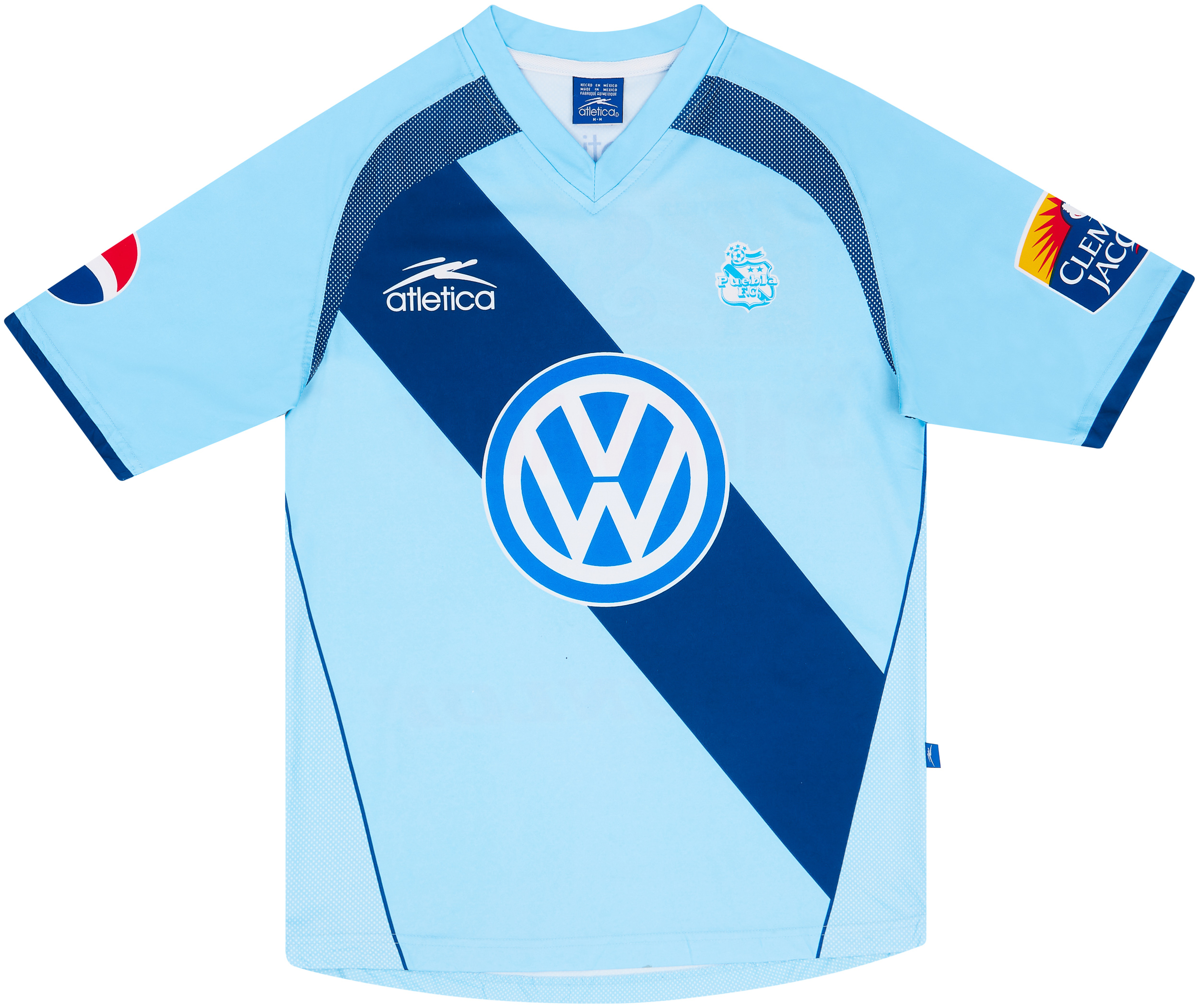Puebla
Introduction Club Puebla, commonly known as La Franja (“The Stripe”), is a prominent Mexican football club steeped in tradition and rich in history. Based in the city of Puebla, this club has carved out a unique identity in the world of football since its inception. With its vibrant blue and white stripes, Puebla embodies the […]
2003-04 Puebla Away Shirt - 8/10 - (M)
106.99£ - ca: €126
2003-04 Puebla Away Shirt - 8/10 - (XL)
106.99£ - ca: €126
2003-04 Puebla Third Shirt - 8/10 - (M)
106.99£ - ca: €126
2017-18 Puebla Home Shirt (S)
70.99£ - ca: €84
2011-12 Puebla Away Shirt - 9/10 - (M)
70.99£ - ca: €84
2018-19 Puebla Away Shirt (M)
58.99£ - ca: €70
2018-19 Puebla Home Shirt (S)
58.99£ - ca: €70
2010-11 Puebla Home Shirt - 9/10 - (L)
47.99£ - ca: €57
2012-13 Puebla Home Shirt - 9/10 - (XL)
47.99£ - ca: €57
2021-22 Puebla Home Shirt
41.99£ - ca: €50
2007-08 Puebla Home Shirt - 6/10 - (Women's L)
35.99£ - ca: €42
2022-23 Reales de Puebla Home Shirt
31.99£ - ca: €38
2022-23 Lobos Puebla Home Shirt
29.99£ - ca: €35
2022-23 Lobos Puebla Away Shirt
23.99£ - ca: €28
Introduction
Club Puebla, commonly known as La Franja (“The Stripe”), is a prominent Mexican football club steeped in tradition and rich in history. Based in the city of Puebla, this club has carved out a unique identity in the world of football since its inception. With its vibrant blue and white stripes, Puebla embodies the spirit of its local community and is recognized as one of the original football clubs in Mexico. Eagerly followed by a passionate fanbase, Club Puebla has a story that intertwines with the culture and identity of Puebla itself.
Club History
Club Puebla was founded on May 7, 1944, in response to the growing popularity of football in the region. The club quickly gained recognition, entering the professional league in 1946. During its early years, Puebla showcased competitive spirit and resilience, leading to various top-league appearances. The club’s first significant milestone came in 1980 when it captured its first Liga MX title. Historical moments for Puebla are characterized not only by their triumphs on the field but also by the fierce rivalries developed over the decades, most notably against Club América and Cruz Azul. Puebla has seen its fair share of ups and downs, including relegations and promotions, but it has remained a staple in Mexican football.
Achievements
Throughout its history, Club Puebla has celebrated numerous achievements both domestically and internationally. The most notable domestic triumph came in 1980 when Puebla won the Liga MX title, a victory that sealed its place in Mexican football lore. Following that, the club added two more league titles in the 1990s, specifically in 1991 and again in 1996. In addition to these league championships, Puebla has also lifted the Copa MX trophy multiple times, with victories in 1983, 1990, and most recently in 2015. While Puebla is often seen as a club with a rich domestic history, its ventures in international competitions, such as the Copa Libertadores and the CONCACAF Champions’ Cup, have furthered its reputation abroad, even though the club has yet to achieve the same level of success outside Mexico. The combination of these titles highlights Puebla’s history as a competitive force within Mexico’s football scene.
Significant Players and Matches
Club Puebla has been home to several significant players throughout its history. One notable figure is Cuauhtémoc Blanco, a legendary striker who left an indelible mark on the club and Mexican football as a whole. Blanco made several impactful contributions when he played for Puebla during the 1990s and early 2000s, helping the team achieve great success. In addition to Blanco, players like Manuel Negrete and Javier “Chicharito” Hernández have also donned the Puebla jersey, demonstrating the club’s role in nurturing local talent. As for landmark matches, the team’s 1980 victory in the final against CD Guadalajara is etched in the hearts of fans, marking the beginning of Puebla’s journey as champions. Other significant matches include climactic Copa MX encounters that underline the high-stakes nature of Mexican football, where Puebla often rose to the occasion.
Cultural Impact
Puebla’s influence reaches well beyond the football pitch. The club has become a cultural institution within the city, fostering local pride and unity among its supporters. Game days transform the atmosphere of Puebla, with fans donning the club’s colors and coming together to share communal experiences. The relationship between the club and its fans is characterized by loyalty and fervor, as evidenced by the passionate support witnessed during home games at the Estadio Cuauhtémoc. The club’s role in local culture is also reflected in various community outreach initiatives, emphasizing its commitment to the region. The strong sense of identity associated with La Franja fosters a community spirit that unites people from diverse backgrounds, forging connections that are cemented through shared love for the club.
Conclusion
In summary, Club Puebla is more than just a football club; it is an integral part of the cultural fabric of the Puebla region and an important player in Mexican football history. From its humble beginnings to its rise as a formidable contender in Liga MX, Puebla has cultivated a legacy of competitive spirit, rich tradition, and community involvement. The enthusiasm of its fanbase, combined with notable achievements and significant talents, ensures that Puebla continues to echo through the annals of Mexican football. As La Franja looks towards the future, its past serves as a profound reminder of its enduring significance in the sport.













